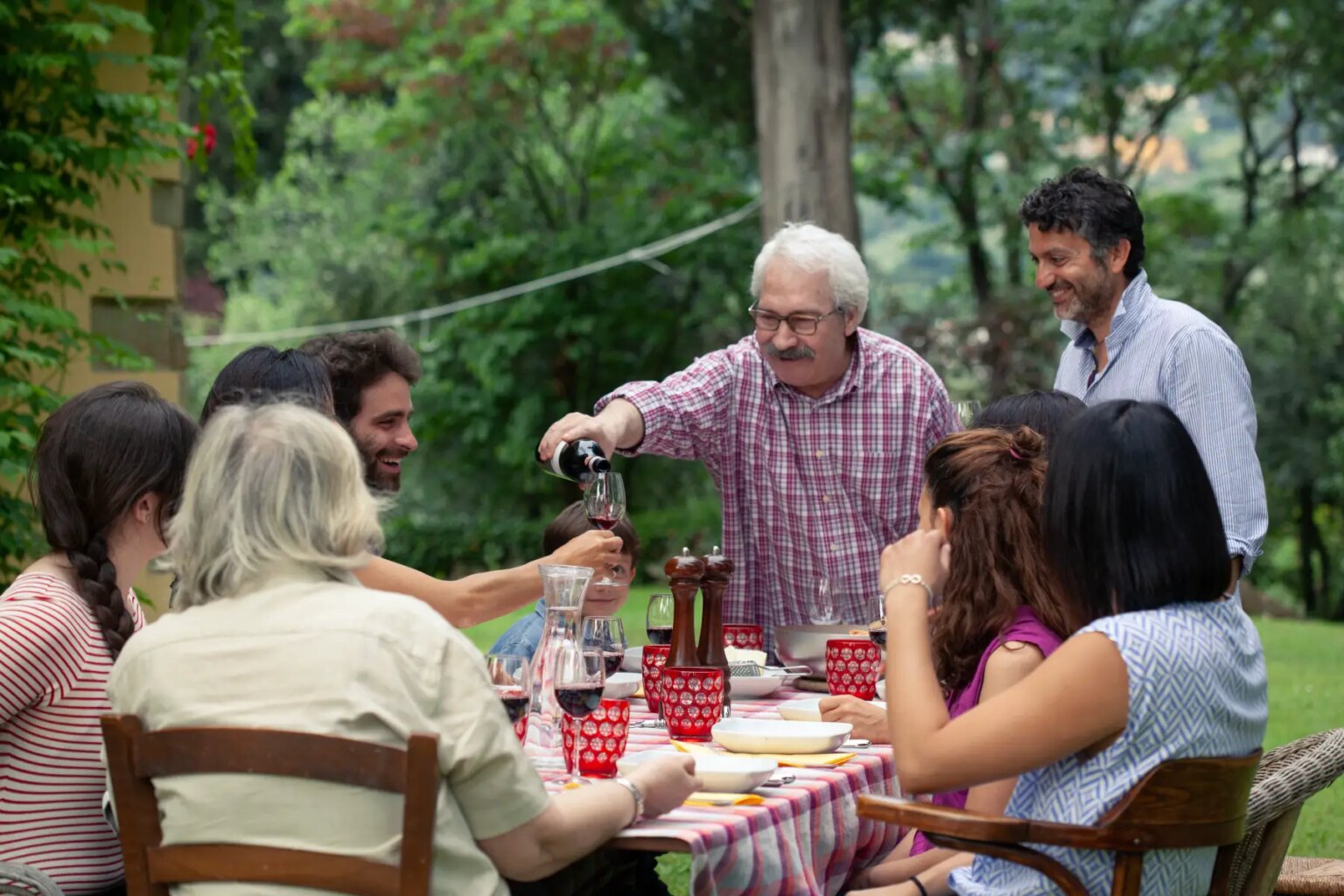When moving to Italy, it can be helpful to pick up on the local language. Italian is wonderfully expressive and is full of colorful words and phrases. Many of these do not translate directly into English.
But, knowing these 20 phrases and words below will offer some insight into the Italian culture and etiquette to help ease your transition as an expat.
- Che bello! – How wonderful!
- Cavolo! – Damn! / Heck!
- Pantofolaio – couch potato
- Capire Roma per toma – To misunderstand something completely
- Avere un diavolo per capello – To be furious
- Essere al verde – To be flat broke
- Apericena – Bites to eat with drinks
- Non mi va – I do not feel like it
- Non è male – It’s not bad
- Non vedo l’ora – I can’t wait
- Avere culo – A lucky person
- Non avere peli sulla lingua – Be direct
- In bocca al lupo – Good luck!
- Buono come il pane – A good person
- Trovarsi tra l’incudine e il martello – Between a rock and a hard place
- Piovere a catinelle – Raining cats and dogs
- Ubriaco come una scimmia – Drunk as a monkey
- Prendere un granchio – To make a mistake
- Buonanotte al secchio – It’s all over
Babbel
Start chatting like a local with Babbel. One of the most popular language-learning apps around, it offers many courses, resources, and live online classes. And, with 13 new languages to choose from, Babbel will have the right course for you.
Che bello! – How wonderful!
Pronunciation: ki-bel-loh
Watch any Italian movie or TV, and you’re likely to hear at least one approving Che bello! You can use this multitasking Italian phrase in several ways, though its translation will depend on the context of your conversation.

For example, you could use it literally to express how beautiful something or someone is. Or, more figuratively, you could use it to show how excited you are about something. It is similar to how you would use ‘How lovely!’ or ‘How wonderful!’ in English.
Cavolo! – Damn! / Heck!
Pronunciation: kah-voh-loh
The Italian culture and people are often associated with expressive flair, also reflected in their language. For instance, cavolo is the Italian word for cabbage, but it doubles as a choice expression of annoyance.
Perhaps you are meeting friends for dinner, and realize that you left your wallet at home only after the bill arrives. Instead of using an English exclamation, like ‘Heck!’ or ‘Damn!’ (or some stronger profanity) try to substitute this word.
Pantofolaio – couch potato
Pronunciation: pan-toh-foh-lah-ioh
If you have your TV set up in your Italian home, you might be tempted to have a relaxing weekend watching movies as a pantofolaio.
Taken from the Italian word pantofola, which refers to slipper, this is the local equivalent of a couch potato.
Capire Roma per toma – To misunderstand something completely
Pronunciation: kah-pee-reh Roh-mah per toh-mah
When you move to Italy, and you are not yet fluent in Italian or have not yet immersed into the culture, you may misunderstand some situations or conversations. This phrase, capire Roma per toma, literally means ‘to understand Rome for toma cheese.’
Avere un diavolo per capello – To be furious
Pronunciation: ah-veh-reh oon dee-ah-voh-loh per kah-pehl-loh

The literal translation is rather descriptive: ‘to have a devil for each hair.’ You can use it when you try to impress on someone how angry you are about a situation or at a person.
Essere al verde – To be flat broke
Translation: eh-seh-reh ahl vehr-deh
If you move to Italy as a student to study at one of its universities, invariably, this phrase will come in handy when you can’t afford to go out for drinks or a meal. It translates as ‘to be in/at the green’ but means that you do not have the money to do or buy something (i.e., flat broke).
Apericena – Bites to eat with drinks
Pronunciation: ah-per-ee-che-nah
Leave it to the Italians to find yet another type of gastronomic experience. Similar to Venice’s (Venezia) chicchetti, Spain’s tapas, or the Dutch borrel, apericena refers to enjoying small bites with drinks, usually with friends.
The word derives from the Italian for aperitivo, or appetizer, and cena, or dinner, and could be described as a heartier version of the popular happy-hour offerings seen across Italy in the evenings.
Non mi va – I do not feel like it
Pronunciation: nohn mee vah
There are plenty of moments when you just don’t feel like doing something, and when that happens in Italy, this is a go-to phrase.
Although it literally translates as ‘it doesn’t go for me,’ you can also use it to say you do not want to discuss something, eat at a certain restaurant, or see a particular movie.
Non è male – It’s not bad
Pronunciation: nohn ee mah-leh
Despite the excitement, expats relocating to Italy can also feel some trepidation when faced with the many practicalities of moving. That’s why a new arrival might describe their move by saying, “non è male.” The ambivalent Italian phrase essentially means ‘it’s not bad.’ It applies to anything that is not wholly fantastic but is not terrible, either.

Non vedo l’ora – I can’t wait
Pronunciation: nohn veh-doh l-oh-rah
Excited about checking out your next Italian destination – or perhaps a hot new date? You might say non vedo l’ora. Because of your excitement, you cannot wait – or, literally: ‘cannot see the time.’
Avere culo – A lucky person
Pronunciation: ah-veh-reh khoo-loh
We all know that person who seems to have all the luck because no matter what they do, things always work out well for them. In Italy, you might describe this person as avere culo, which means to be fortunate. However, you would never guess this from the literal meaning: ‘having an ass’ (i.e., a donkey).
Non avere peli sulla lingua – Be direct
Pronunciation: nohn ah-veh-reh peh-lee suh-lah leen-goo-ah
Always find yourself being described as direct? In Italy, this character trait is appreciated, and you might be referred to as non hai peli sulla lingua.
This literally translates to ‘you do not have hair on your tongue,’ meaning you are straightforward (i.e., don’t mince words), even if it will upset someone.
In bocca al lupo – Good luck!
Pronunciation: een boo-ka ahl loo-poh
If you know your Italian facts, you might recall that Rome (Roma) was supposedly established by twin brothers Remus and Romulus. According to legend, a she-wolf found them by the River Tibus. This myth inspired the way Italians now wish each other good luck. For example, when wishing someone luck for an exam or interview, you say in bocca al lupo, which literally means ‘in the mouth of the wolf.’ Think of this as the Italian equivalent of the English saying ‘break a leg.’

The correct response would be, “Crepi il lupo” translating into ‘the wolf shall die.’ This is because Italians believe that saying ‘good luck’ and ‘thank you’ actually brings bad luck.
Buono come il pane – A good person
Pronunciation: boo-oh-nah koh-meh eel pah-neh
Once you’ve made a new friend who you trust, you might describe them as buono come il pane. In English slang, you would call them a ‘good egg.’ But in Italian, you use ‘good as bread’ to imply that someone is an all-around good person, with integrity.
Trovarsi tra l’incudine e il martello – Between a rock and a hard place
Pronunciation: troh-vahr-see trah l-een-khoo-dee-neh eh eel maar-tehl-loh
Say you’ve moved to Italy and cannot buy or rent a car because you forgot your driver’s license and haven’t got a registered Italian address yet. That dilemma is what an Italian might describe as trovarsi tra l’incudine e il martello.
The Italian phrase translates to ‘stuck between the anvil and the hammer,’ better known in English as ‘stuck between a rock and a hard place.’
Piovere a catinelle – Raining cats and dogs
Pronunciation: pee-oh-veh-reh ah kah-tee-nehl-leh
You can break this one out during Italy’s wet season when it starts to rain heavily, and you want to use the English phrase ‘raining like cats and dogs.’
Ubriaco come una scimmia – Drunk as a monkey
Pronunciation: ooh-bree-ah-koh koh-meh ooh-nah sheem-meeah
Italy has a fantastic food and drink culture, so you might need this phrase occasionally. For example, if someone has indulged in a few too many table wines, Negroni Sbigliatos, or Aperol Spritzes, then you might say they are ubraico come una scimmia. It has the same meaning as the English ‘drunk as a skunk,’ except the animal in question is a monkey.
Prendere un granchio – To make a mistake
Pronunciation: prehn-deh-reh oon grahn-kee-oh
When you go to the beach with your children, they try to catch a little crab and soon realize it is a mistake. And that is exactly what prendere un granchio means: ‘to catch a crab’ or you’ve made a mistake.
As a newcomer to Italy, you may use this phrase frequently when getting on the wrong public transport or grabbing an incorrect item at the supermarket.
Buonanotte al secchio – It’s all over
Pronunciation: boo-oh-nah-noh-teh ahl seh-kee-oh
The last phrase fits well to conclude this article. The literal translation is ‘goodnight to the pail,’ but it means something is finished or all over.



